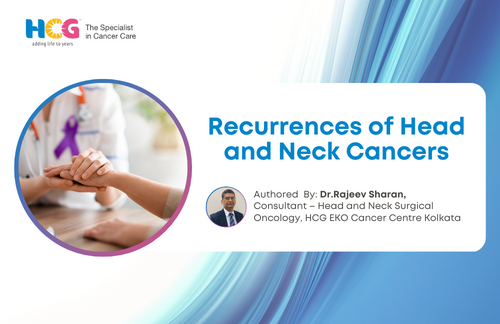
22 Apr, 2024

22 Apr, 2024
Of the many things that make the cancer journey physically and mentally taxing, fear of recurrence is one of the most important ones. Its natural to wonder if youll ever be able to return to your pre-cancer life, or if youll need to live in constant fear of the disease returning.
Its important to remember that while cancer recurrence is always a possibility, there are steps you can take to reduce your risk and stay healthy. Your doctor may advise you to make certain lifestyle changes or to stay vigilant about follow-up appointments, but this is not meant to be a warning or a cause for constant worry.
In fact, taking an active role in your own health can be empowering and can help you regain a sense of control over your life. By making healthy choices and staying informed about your treatment options, you can reduce your risk of recurrence and live a fulfilling life after cancer.
In this article, Dr. Rajeev Sharan from HCG Cancer Centre - Kolkata is answering some of the most frequently asked questions about head and neck cancer recurrences
Dr. Rajeev Sharan: The recurrence of head and neck cancers can happen for various reasons. At times, even after the treatment, a small number of cancer cells are still left behind, and these cells divide and form a tumour. Sometimes, the follow-up tests fail to detect the presence of cancer cells, and these cells divide over time and form a tumour. At times, new cancerous growth in adjacent tissues can also lead to recurrence.
Also, the chances of recurrence depend on multiple factors, such as the type of cancer, its stage, and the treatment response shown by the patient.
Dr. Rajeev Sharan: No, not all patients who have been treated for head and neck cancer report a recurrence or relapse. Recurrences are caused by various factors, as mentioned earlier. Also, certain types of head and neck cancer are more likely to recur than others.
Dr. Rajeev Sharan: Not necessarily. Depending on the stage and type of head and neck cancer, they may recur in the head and neck region only (local recurrence), areas close to the region where the original tumour was located (regional recurrence), or in the distant part of the body (distant recurrence).
Dr. Rajeev Sharan: Head and neck cancers may recur within months or even many years after the treatment. This again depends on factors, such as the type of cancer, its stage, the patient’s response to the initial treatment, etc.
Dr. Rajeev Sharan: Consumption of tobacco and alcohol, poor diet, lack of exercise, etc., are a few lifestyle factors that can increase the risk of head and neck cancer recurrence. Therefore, it is important to have a healthier lifestyle after cancer treatment. Also, it is imperative for patients to keep up with their follow-up appointments as recommended by their doctors. These visits can help in the early detection of recurrence.
Dr. Rajeev Sharan: Some of the common signs of head and neck cancer recurrence include difficulty swallowing and speaking, the appearance of a new lump in the region where the first tumour was located or the area close to it, hoarse voice, white or red patches inside the mouth, pain that does not go away, etc. When any of these symptoms lasts longer than two weeks, it is important to seek appropriate medical attention.
Dr. Rajeev Sharan: Once the recurrence is confirmed, your expert team will devise a customised treatment plan, based on where the cancer has recurred and its size. The treatment plan may include surgery, radiation therapy, chemotherapy, or other systemic therapies like immunotherapy and targeted therapy. These treatments may be administered individually or in combination.
Dr. Rajeev Sharan: There are no known ways to eliminate the risk of head and neck cancer recurrence. However, it is possible to reduce its risk. Some measures that can help reduce the risk of head and neck cancer recurrence include cultivating healthier lifestyle habits, becoming aware of risk factors associated with the recurrence and avoiding them, keeping up with follow-up appointments, and seeking appropriate medical attention when something is not normal.
Those were some of the commonly asked questions on head and neck cancer recurrence. Not all patients treated for head and neck cancer will have a recurrence. Nevertheless, it is important to be aware of the factors that can lead to recurrence, learn what can reduce its risk, and adopt appropriate measures to lead a normal, and more-rewarding life after cancer.